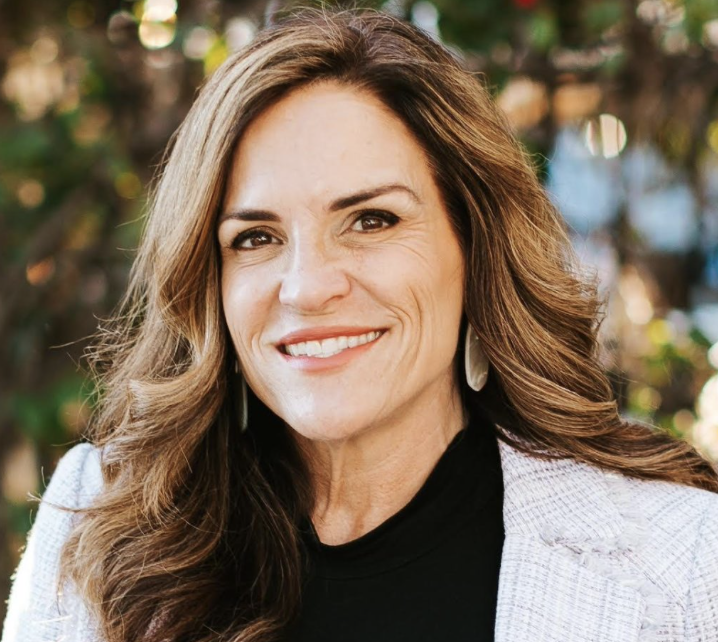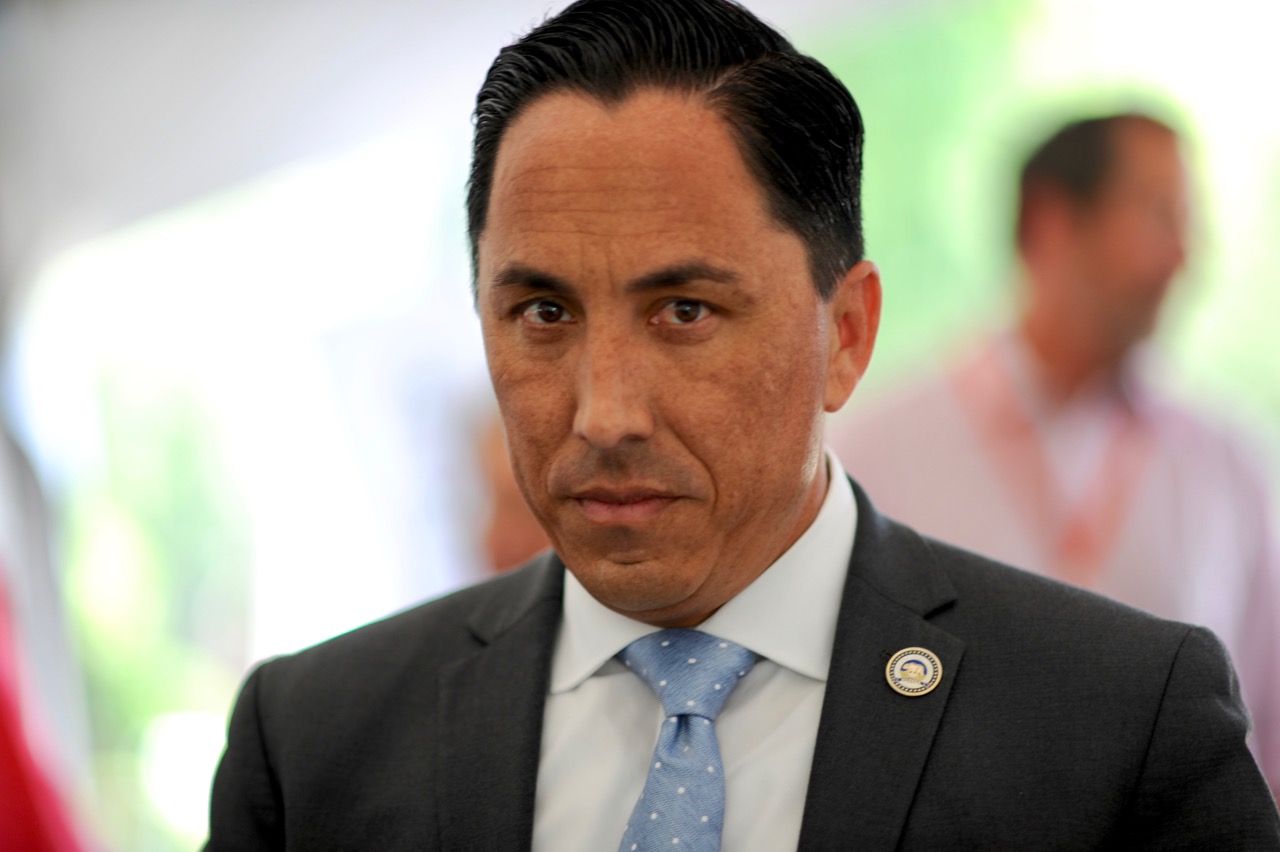
Amy Reichert. (Photo: AmyforSanDiego.com )
Four San Diegans Want to Replace Nathan Fletcher…
…But only Amy Reichert will tell Globe readers why
By Thomas Buckley, August 11, 2023 9:52 am
There will be four people on the San Diego County Supervisorial District 4 Special Election ballot on August 15.
They are running to replace the utterly disgraced Nathan Fletcher, who resigned the seat earlier this year after he was sued for sexual assault…and went to rehab for alcohol…and first blamed that on PTSD from his military service that ended years ago…and after dropping out of a state Senate campaign…and after leaving his second wife a few years ago for the egregious Lorena Gonzalez, who pushed the anti-freelancer AB-5 bill before shockingly being tapped to take over the California Labor Federation…and after switching political parties when it seemed the local Republicans were not terribly thrilled with him…after working for the astonishingly corrupt Congressman Duke Cunnigham…and after quite possibly arranging for an offer of county money to his assault accuser to keep her mouth shut…and after quite possibly arranging for her to be fired after she said no…and after “friend of the worker” Gonzalez reportedly threatened her if she came forward against her husband…and after being described as a close friend of Gavin Newsom…and after being described a potential successor to Newsom.

Those are some very large, extremely mephitic shoes to fill.
So, as the Globe has done in the past, we asked each of the candidates to take part in a question-and-answer story or two – we ask and then print their answers verbatim. We feel it’s helpful to both the candidates – no filters – and the public – direct information.
Only one – Republican Amy Reichert – replied. And we will get to her answers after we take a quick look at the other three who couldn’t be bothered to talk to the people they hope to represent.
First, Republican Paul McQuigg. According to his website, he is a retired Marine who now works for the U.S. Census, is opposed to the “housing first” concept to end homelessness, touts the simplicity of mobile homes to provide affordable housing quickly, and would offer new deputies help with buying a home to try to attract personnel.
Second, we have Democrat Janessa Goldbeck. Goldbeck is also a Marine vet, leads the non-profit group Vet Voice, serves on the Mayor’s LGBT Task Force, wants to make more safe parking and camping lots for the homeless, and is endorsed by county king – or in this case queen – maker California senate Pro Tem leader Democrat Toni Atkins.
Third, we have Monica Montgomery Steppe. Steppe is on the San Diego City Council, she wants to open more homeless shelters, expand Medi-Cal, raise the minimum wage, supports “restorative justice,” and is endorsed by the county party and bunches of local labor unions.
And now we have Amy Reichert – in her own words. First, the short bio she provided:
Amy Reichert is a lifelong San Diego who is running for San Diego County Supervisor to make a significant change for families in District 4. Her primary objectives include making San Diego more affordable for struggling families, providing shelter and essential services to the homeless community with compassion and accountability, preserving the unique character of neighborhoods, and ensuring public safety by addressing crime and backing our first responders.
Amy has been a crucial defender of various groups’ rights in the region, including children, first responders, teachers, healthcare workers, and small businesses. Her efforts to unify people from diverse political backgrounds towards a common goal have been instrumental in promoting collaboration and progress in the region.
With a degree in Political Science from San Diego State University, and her passion for San Diego, Amy brings a wealth of knowledge and expertise to the table. She is a successful small businesswoman and founder of a nonprofit that has saved thousands of jobs with a Federal lawsuit that forced the City of San Diego to repeal the vaccine mandate that would have prohibited people from holding elected office or working for the City of San Diego if they did not get the Covid shot. Amy currently resides in District 4 in La Mesa with her husband and two sons, giving her a first-hand understanding of the challenges faced by families and small business owners in the region
And now the questions and answers:
- Highly controversial Vehicle Mile Traveled tax concepts – by the mile, by the area, etc. – have been floated for San Diego County. What is your position on the idea of taxing drivers by the mile in general?
I have consistently and vigorously opposed the misguided mileage tax proposed by SANDAG to tax people per mile as much as $900 a year. This ill-conceived scheme would hit the hardworking people in San Diego who are already struggling with the skyrocketing cost of living and who already pay at the pump. San Diego County’s transportation system requires an approach to effectively address the demands of the 21st century. Relying solely on taxing vehicle drivers, who constitute 97% of the population, to finance projects aimed at benefiting the 3% of public transit users appears impractical. It’s crucial to recognize that our economy heavily relies on well-functioning freeways and roads, which serve as the fundamental infrastructure supporting our transportation network.
- SANDAG is a powerful force in the County. Do you believe it should remain so and/or does the agency and its relationships with other local government agencies need to be changed?
SANDAG has devolved into disarray under the leadership of the departing Executive Director, Hasan Ikhrata. Despite pledging nonpartisanship, he gave political donations to his favored candidates in his attempt to stack the board with partisan members who endorsed his $165 billion budget. SANDAG has broken promise after promise, by not prioritizing the projects they promised the voters in the 2004 Ballot Measure. San Diegans should not give them another dime until they fulfill the promised projects.
- What is your position on controlling the border in general and, specifically, in San Diego County? Are current programs working as well as they should be for the residents of the County?
Last week, I joined the Border Patrol on a border tour—an eye-opening experience. The flood of Fentanyl across our borders is alarming, and our agents are bogged down with excessive paperwork for each asylum seeker. Shockingly, Fentanyl overdoses have claimed lives as young as 13 in San Diego County. As your future county supervisor, I’m committed to standing up to the Federal government, forging a regional strategy to shield our children from Fentanyl’s deadly grasp and combat child trafficking head-on.
- Do you believe public transit programs or new/expanded roadways should take priority when it comes to government planning and funding?
I recently participated in a Climate Action Social Justice forum, where 200 passionate advocates for public transportation were present. To my surprise, when I asked how many had used public transit to attend, only 2 hands went up. With crumbling roads throughout our county, let’s ensure balanced priorities—public transportation shouldn’t take priority over urgent road repairs and necessary safety improvements.
Back in 2004, the residents of San Diego were asked to approve a 40-year, half-cent sales tax, with the enticing commitment of addressing critical road and highway enhancements. With resounding voter support, SANDAG undertook this initiative, projecting a substantial $14 billion revenue infusion aimed at alleviating congestion, enhancing safety, and augmenting federal and state contributions for significant freeway upgrades, including I-5, I-8, I-15, SR 52, SR 54, SR 56, SR 67, SR 76, SR 78, SR 94, SR 125, and I-805. This commitment was prominently featured as the foremost agenda item in the ballot statement.
Regrettably, as we find ourselves 14 years into this 40-year tax endeavor, many pledged freeway undertakings have yet to see the light of day. Surprisingly, SANDAG is now ushering in various commitments toward public transportation. Curiously, these new proposals revolve around reducing traffic by steering us away from personal vehicles and into trains and buses rather than expanding the freeway network as initially pledged. The previously championed freeway initiatives have conspicuously vanished from SANDAG’s new roadmap. Nevertheless, the citizens of San Diego County are bound to sustain their contributions towards these unfinished freeway aspirations until 2048. I do not favor any public transportation projects until SANDAG fulfills its promise to the voters.
- The person you hope to replace – Nathan Fletcher – has vacated his seat under a cloud of scandal (to say the least). How should the County proceed with any further investigations of Fletcher misdeeds and how can such shoddy actions by public officials can be prevented in the future?
Just like anyone else, Nathan Fletcher is innocent until proven guilty and deserves a fair trial and any necessary investigation to see if he had enablers who knew and did not protect the alleged victim.
As we navigate the legal proceedings involving Mr. Fletcher, one truth remains evident: an abuse of power occurred. Exploiting his influential position at MTS, he manipulated a subordinate, a fundamental violation emphasized in sexual harassment training. Regrettably, Nathan Fletcher failed to uphold these standards. A rightful step forward would be for him to reimburse his donors and utilize personal funds to cover legal expenses. Such misuse of power should be unequivocally condemned.
- The pandemic upended life all around the planet, including San Diego County. Do you think the County reacted appropriately during the pandemic and what would you have done differently?
As the co-founder of ReOpen San Diego, I championed the safe reopening of schools, places of worship, and businesses. Our nonprofit defended the rights of over 2000 City of San Diego workers, including essential personnel like police, firefighters, dispatchers, and lifeguards, ensuring they weren’t penalized for their vaccination choices. We secured a victory in Federal court in January 2023, reinforcing the importance of individual freedom. While met with opposition initially, I’m pleased to note that the majority of San Diegans now recognize the significant errors made in the county’s Covid response and could have protected the vulnerable much better.
- San Diego’s housing is both expensive and in short supply. What can the County do to remedy that situation?
Get the government out of the way. Over 1/3rd of housing costs are from government regulations which drive the cost of housing up dramatically. We must allow builders to build single-family homes where it’s applicable. With record home prices, it would seem like developers would be clamoring to build new housing units to meet the demand. However, this is not the case. Despite the rising prices, the number of new units being built continues to flatline. This is due in part to the fact that much of the land that could be developed has been removed from the market by the state of California. New requirements and regulations have made permitting so long that only the most expensive units are economically feasible to build. This means young families, seniors on fixed-income, and middle-class San Diegans can’t afford to live here. It is simple supply and demand.
- Crime is up in San Diego County. Why do think this is occurring, what is your opinion of “restorative justice,” and do you believe state measures like Prop 47 have contributed to the problem?
I recently joined a veteran San Diego law enforcement officer with over 25 years of experience on a ride-along. His insight was clear: Proposition 47 has led to a rise in “lawlessness” and fueled addiction through stolen property. I share this concern and strongly advocate for mandatory treatment for individuals who have committed serious crimes but also struggle with mental illness and severe addiction. This year, the San Diego Police Officers Association gave me an honorary badge patch, the same one officers wear on their shoulders as a way of thanking me for saving their jobs when the City of San Diego planned to terminate them without offering a religious exemption. I back our police and support our first responders.
- Continuing on crime – should the essential decriminalization of crimes like shoplifting be reversed?The status quo is failing right here in Hillcrest, a neighborhood in San Diego and in the District I campaigning to represent as the next county supervisor. A longstanding Starbucks recently closed its doors after three decades, unable to ensure safety for its employees and patrons. Downtown San Diego businesses are resorting to locked front doors during operating hours, and some are even closing their doors permanently. Let’s be clear: shoplifting is not a victimless crime, and decriminalization is not the answer.
- The state is projecting zero population growth for the next 37 years; even San Diego’s growth projections have been cut. How should this impact government agencies’ current and future plans?
The exodus from San Diego County is real – a 50,000 population decline since 2020. Friends and family are moving away, driven by the desire for affordable single-family homes. Let’s respond by intelligently and securely developing homes, ensuring our loved ones can stay, and generations can thrive in a place where their dreams of homeownership become a reality.
- Staying on population – why do you think people are leaving the state in such high numbers?
At the end of the day what people want is an affordable place to live, a safe place to live, that they can enjoy. By every metric, San Diego is dramatically worse than just 5 years ago. We need to stop electing the same kind of people like Nathan Fletcher who got us into this mess with expensive failed government programs and disastrous government overreach that is killing small businesses.
- Do you think the concept of “harm reduction” in regard to the explosion of drug (like fentanyl) use, overdoses, and deaths is effective?I was a Celebrate Recovery leader and I led thousands of people who struggled with addiction into treatment and recovery. From my experience, enabling is disabling. While Narcan is effective, it is just a Band-Aid compared to the Fentanyl flooding over our border daily. The $100 million opioid settlement that the county received should be used for treatment, not “safe smoking supplies” also known as crack pipes.
- One of the most pressing and controversial issues facing the County is the issue of homelessness. Why has the population exploded in the past few years? Do you think the “housing first” concept has merit? Should law enforcement be enforcing existing “quality of life” laws (loitering, public intoxication, etc.) that most homeless people are violating? How would you end the problem?
The homeless humanitarian crisis is a heart-wrenching issue, made more complex by unproductive wasteful approaches. Despite electing similar leaders and investing billions in “Housing First,” the crisis persists as this approach lacks funding for treatment and recovery programs. My strategy, “Shelter First, with treatment,” prioritizes human lives over sleeping on the streets. My solution, “Shelter First, with treatment,” prioritizes compassion and action.
And here’s Amy’s website: https://amyforsandiego.com/
Good luck!
- Benefit Fraud Problems and Solutions - November 7, 2024
- A Little Exit Poll - November 5, 2024
- Tomorrow’s Headlines Today! - November 5, 2024





I don’t find her promises to “As your future county supervisor, I’m committed to standing up to the Federal government” any more compelling than the rest. I want to hear plans for *legal fights* against the corrupt power structure! I want someone to fight the Enviro-Marxists running this state, tying up every project with litigation! I want someone who stop the FORCED “climate change” green agenda of expensive intermittent windmills and solar panels!